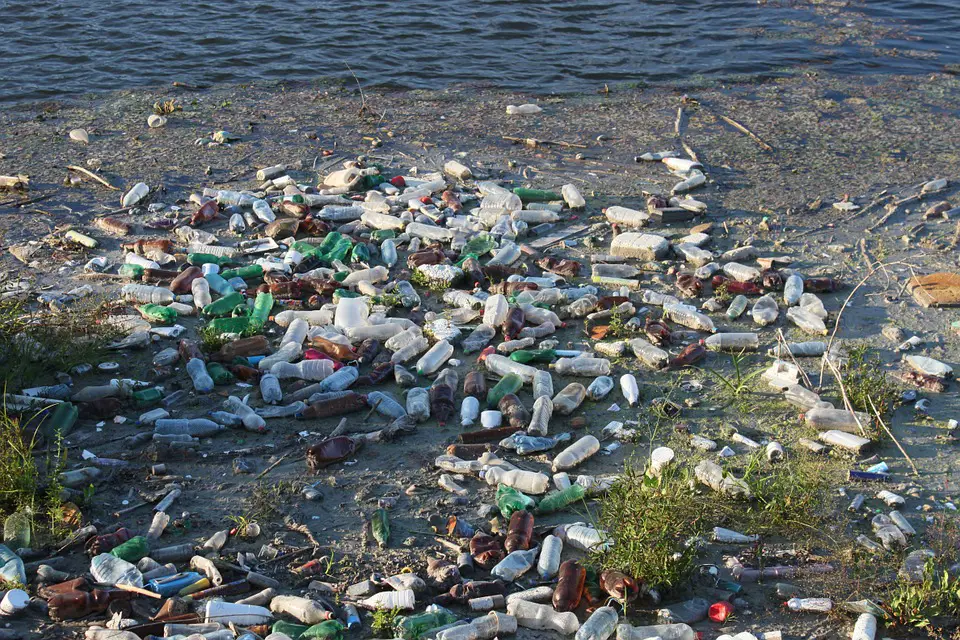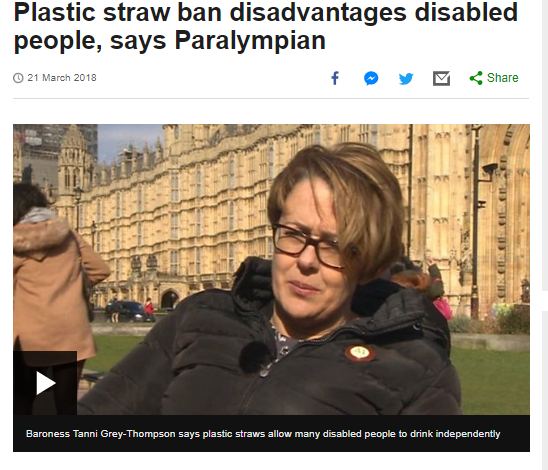What are the alternatives to plastic straws?

What are the alternatives to plastic straws for disabled people and should you make a switch?
It won’t have escaped your attention that plastic straws have been in the headlines throughout 2018. With the seas full of plastic particles, and sea life choking to death around the world on the discarded remains of our consumer culture, attention has moved on from plastic carrier bags and onto the humble drinking straw. In England alone it is estimated that some 4.6 billion of them are disposed of each year. Ahead of EU legislation coming into effect, they are likely to be banned – and some major food retailers, including the likes of McDonald’s and Starbucks, have already announced their intention to stop using single use plastic straws in favour of biodegradable cardboard.
This is great news for sea life, but potentially much worse news for many disabled people, for whom the alternatives are not always practical – and in some cases actively dangerous.
For example, metal straws are often touted as an environmentally friendly alternative to single use plastic straws, as they can be cleaned for re-use over and over. However, many people live with conditions that render them impractical. Anyone suffering from a condition where seizures are a potential problem – such as epilepsy – are at risk of damage to their mouths from stainless steel metal straws, for example. Glass straws are also available and whilst they may be better for ensuring that they are clean on reuse, they may break and cause injury and are not recommended. Moreover, metal and paper straws alike are not flexible, which is a major problem for people with mobility or posture issues.
Then there are the basic issues of hygiene. It is very well to say that straws are ‘reusable’ but that reuse must follow washing. For people caring for someone reliant on semi-solid foods, washing something as fiddly as a straw is not necessarily an easy job.

The biodegradable alternatives such as paper straws also pose a set of problems: even for non-disabled users, it is easy for the straw to turn to mush if a drink isn’t drunk quickly enough, or if chewed a little too much. For disabled users who may take a little longer to drink or who may have dexterity problems, this issue is magnified. The side effects might not be severe in themselves, but there is trouble enough eating through a straw as it is, without the added problem of finding it blocked or turning to pulp in your mouth.
It is true that alternatives are available – such as these silicon straws, which offer flexibility and safety – but they also cost a relatively large sum, and while on paper they are infinitely rewashable, we all know that in real life keeping specialist equipment clean isn’t easy and real world lifespans are not often as advertised.
Other specialist straws
There are other specialist products for other conditions – such as straws with one-way valves . One way valve straws allow you to suck and stop without losing the air pressure that keeps the liquid in the straw and are therefore useful for people who cannot suck very strongly or consistently. (We have discussed these before on a previous post). These are often plastic anyway and whether they will be exempt from a future ban is yet to be known. They carry an even greater price overhead, and come with the same issues around hygiene as the alternatives.
The argument for disabled people continuing to use plastic straws
To put things in perspective, the price of a single pack of silicon straws would be enough to buy almost two thousand single use plastic straws. Would those same pack of silicon straws last for 2000 meals and drinks? Maybe, but perhaps not…..
Perhaps the best way to consider this analogy would be rubber gloves. While it is possible to buy well-made, washable and reusable gloves, almost all healthcare now involved single use rubber or plastic gloves, for all the same reasons: they offer the best balance of hygiene and convenience. Yet in the current climate of panic, nobody seems to be suggesting that healthcare professionals stop using them.
We are all on the same side in wanting a solution to end plastic pollution in the oceans, but that cannot come at any cost. The dignity and safety of disabled people must still be considered, and in the rush towards a blanket ban it is important not to lose sight of these basic human needs and the large, often unheard, minority of disabled people for whom they are small part of living with dignity and independence.
Baroness Tanni Grey-Thomson spoke out when a ban was discussed in the UK :
“Disabled people will be seriously disadvantaged if we can’t find a proper alternative”.
Should you stock up?
A ban on plastic straws of some sorts looks increasingly likely. It’s unlikely that you will never be able to get them from anywhere, but if a ban does come into force you might struggle to get hold of them for a while. We’d certainly recommend considering stocking up if that would impact your life – especially when you can bulk hundreds (or even thousands) for relatively little money.
Other Alternatives
Our friends at http://sturdystraw.co.uk/ sell a fantastic range of hygienic, bendable rubber straws – along with other accessories.

Mark developed sturdy straw and sells it from his website. It is position-able with a bendable rod and has accessories to make it work for you.
Another great thing to check out is the Hydrant drinking system – which comes with hanging clips and a bite valve to make drinking that bit easier.
On a final note, one thing you should not feel is guilty if your situation requires you to use plastic straws. While the issue is a big deal in the media, there has to be recognition of the role that plastic straws play in the lives of many disabled people, and that other problems – such as disposable water bottles, non-recyclable packaging are far bigger in scale without attracting anything like the attention.
Many of us use disposable medical equipment in our daily lives because there isn’t a practical reusable alternative in that situation, I would argue that disabled people using plastic straws should be considered in the same way.
This video explains the whole issue (and is awesome!)

